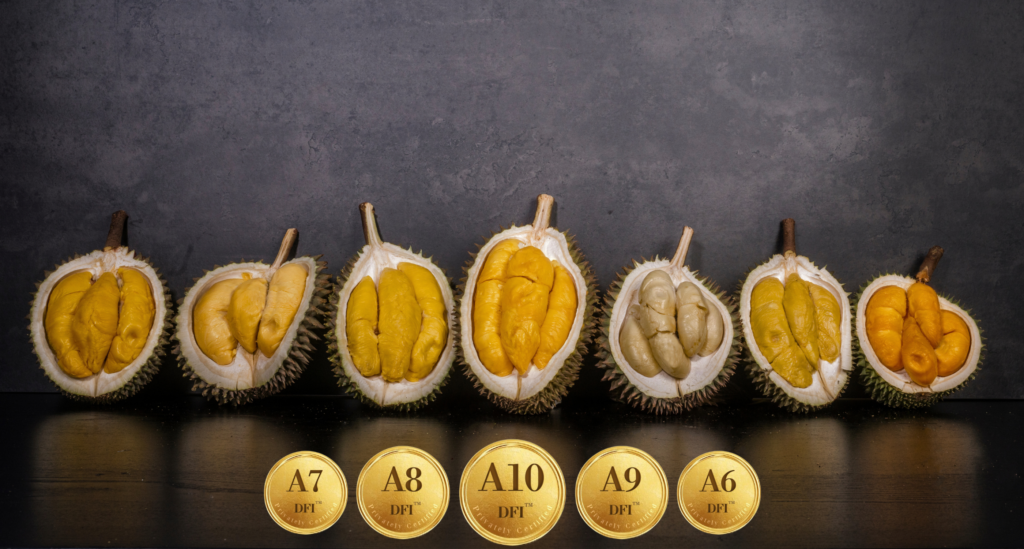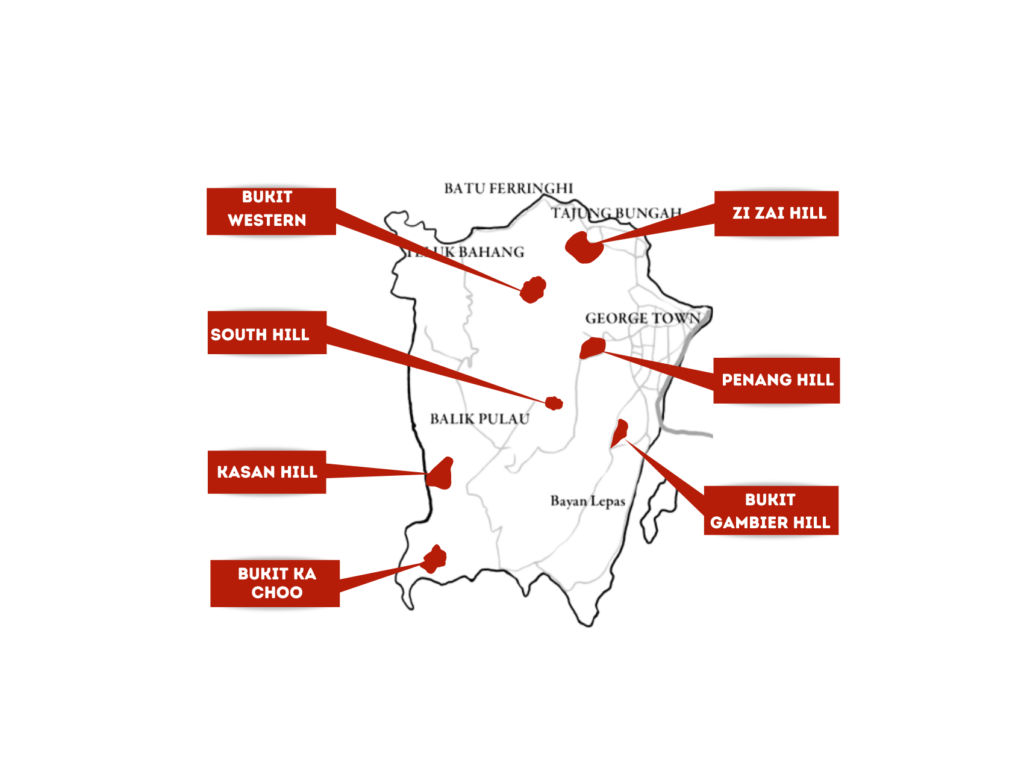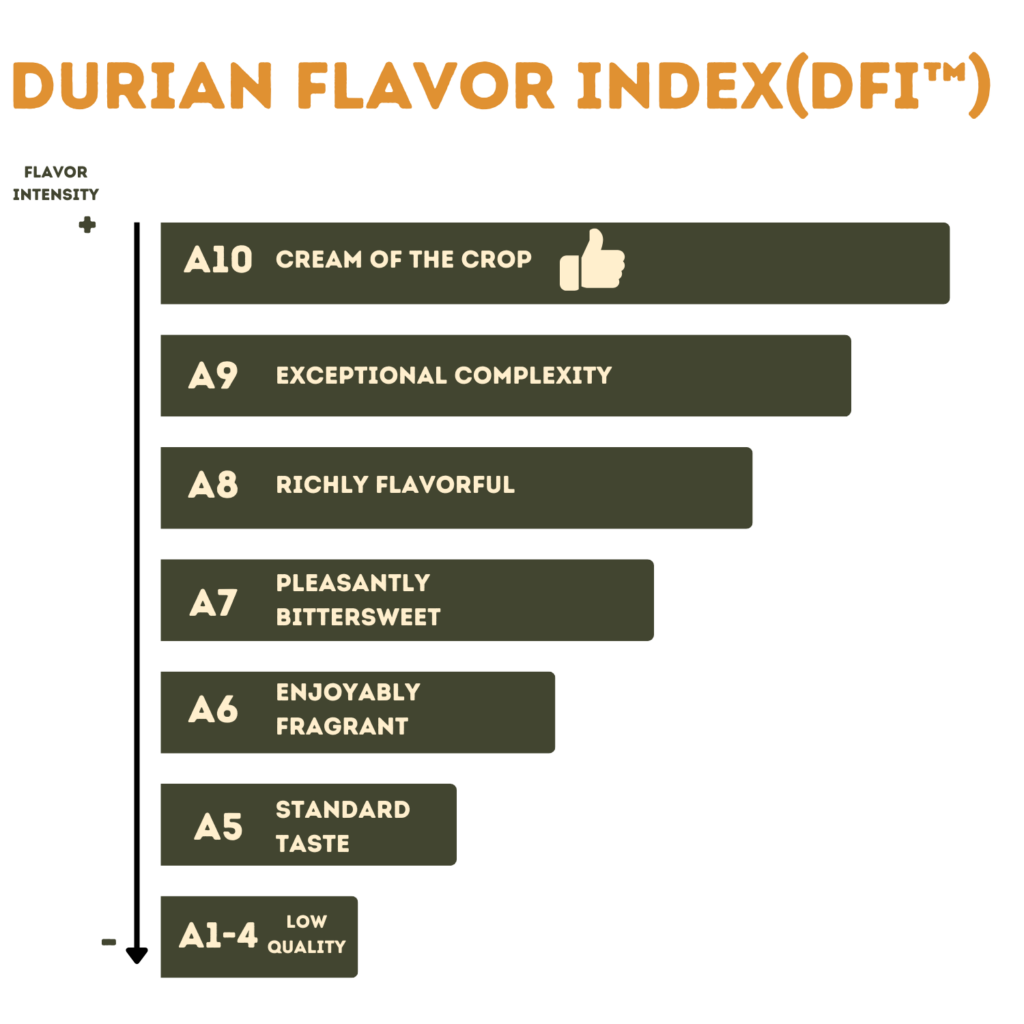penang durian
Celebrated for its unparalleled richness, ranks highest on the Durian Flavour Index. These multiple-time winners of the Durian Championship promise mind-blowing notes and flavors. Exclusively here at Durian Delivery.


The Durian Flavor Index ranks durians by their Volatile Compounds (VOCs) which gives durians their flavors. With A10 having the strongest flavor and A1 the mildest.
The grading system generalizes durian taste based on origin, influenced by the environment. The most ideal region as of 2024 is Penang!

Durians are known for their unique and intense aroma, which is often described as a combination of sweet, savory, and sometimes sulfurous notes. What contributes to the flavor and fragrance of the durians are a variety of volatile compounds. These compounds include esters, ketones, alcohols, and sulfur-containing compounds. Here's a breakdown of the key volatile compounds(VOCs) that contribute to the characteristic flavor and aroma of durians:
Esters are commonly associated with fruity and sweet aromas. In durians, esters such as ethyl 2-methylbutanoate and ethyl cinnamate contribute to the fruity and sweet scent.
Ketones contribute to the creamy and sometimes cheesy aroma of durians. Notable ketones in durians include acetoin and diacetyl (2,3-butanedione), which are often linked to buttery or creamy smells.
Alcohols, such as ethanol and 1-propanol, add to the complexity of the durian's aroma by providing slight alcoholic or fermented notes.
Sulfur-Containing Compounds
• Sulfur compounds are primarily responsible for the strong, pungent smell often associated with durians.
These include:Ethanethiol: This compound has a strong ador reminiscent of rotten eggs or garlic.
• Diethyl disulfide and diethyl trisulfide: These compounds contribute to the garlic-like and oniony aromas.
• Hydrogen sulfide: This compound is known for its characteristic rotten egg smell.
Thioesters, such as ethyl (2)-2-methy|butanoate, provide fruity and sulfury notes, contributing to the complex interplay of flavors in durians.
Durians are known for their unique and intense aroma, which is often described as a combination of sweet, savory, and sometimes sulfurous notes. What contributes to the flavor and fragrance of the durians are a variety of volatile compounds. These compounds include esters, ketones, alcohols, and sulfur-containing compounds. Here's a breakdown of the key volatile compounds(VOCs) that contribute to the characteristic flavor and aroma of durians:
Esters are commonly associated with fruity and sweet aromas. In durians, esters such as ethyl 2-methylbutanoate and ethyl cinnamate contribute to the fruity and sweet scent.
Ketones contribute to the creamy and sometimes cheesy aroma of durians. Notable ketones in durians include acetoin and diacetyl (2,3-butanedione), which are often linked to buttery or creamy smells.
Alcohols, such as ethanol and 1-propanol, add to the complexity of the durian's aroma by providing slight alcoholic or fermented notes.
Sulfur-Containing Compounds
• Sulfur compounds are primarily responsible for the strong, pungent smell often associated with durians.
These include:Ethanethiol: This compound has a strong ador reminiscent of rotten eggs or garlic.
• Diethyl disulfide and diethyl trisulfide: These compounds contribute to the garlic-like and oniony aromas.
• Hydrogen sulfide: This compound is known for its characteristic rotten egg smell.
Thioesters, such as ethyl (2)-2-methy|butanoate, provide fruity and sulfury notes, contributing to the complex interplay of flavors in durians.
In general, the higher the DFI means higher concentrations of volatile organic compounds (VOCs) in durians result in a stronger and more intense flavor. However, the enjoyment of this flavor is subjective and depends on individual preferences.
Don't worry! That's where we step in! Our Durian Flavor Index is based on the concentration of VOCs. The higher the grade(A10), the higher the VOC concentration.
How do we know this?
Many factors contribute to the concentration of VOCs, especially climate and cultivation practices. Ideal temperatures (24°C to 30°C), well-distributed rainfall with a dry period for flowering, balanced humidity, and rich, slightly acidic, well-drained soils provide essential support for tree health and fruit development.
Adequate sunlight promotes photosynthesis, while advanced agricultural practices like pruning, fertilization, irrigation, and pest control enhance fruit quality. Additionally, specific durian varieties adapted to local conditions exhibit genetic differences that affect VOC production. Together, these factors ensure healthy trees and higher VOC concentrations, resulting in better-tasting durians.
In Malaysia, Penang is renowned for producing the best durians, with varieties like Musang King and D24 praised for their strong, complex flavors and creamy texture. The consistent tropical climate and advanced cultivation techniques in Penang contribute to their superior quality. Pahang and Ipoh are also known for high-quality durians, but they generally do not match the exceptional standards of Penang. However, the durians from Pahang and Ipoh are considered better than those from Johor, which, despite producing good durians, do not achieve the same level of acclaim as those from Penang, Pahang, or Ipoh. This hierarchy of durian quality underscores the importance of regional differences in climate, soil conditions, and cultivation practices, resulting in the diverse flavor profiles of durians across different regions.

Grown in the ideal tropical climate and fertile soil of Penang resulting in superior quality and distinct taste.
The most renowned durian in all of Malaysia. Exclusively sold here at Durian Delivery.
